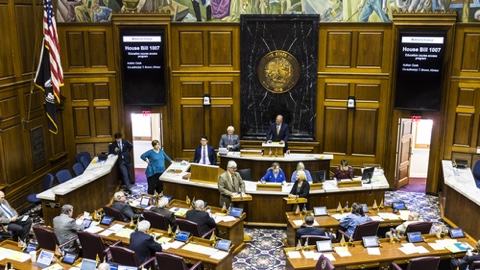
Written by guest author Lauren Riga
The Indiana General Assembly’s 2017 Legislative Session recently adjourned with the passing of a two-year $32+ billion budget. The new budget contains key wins for technology and innovation. The General Assembly’s legislative priorities included venture capital, entrepreneurship and advanced infrastructure.
Internet of Things (IoT) Transforms Business & Government
The Internet of Things (IoT) is transforming businesses worldwide while at the same time creating opportunities to optimize government services and improve communities. Indiana’s economy is primarily driven by companies that make things, move things and grow things; and happens to be a global competitor in key industries where technology is disrupting the status quo.
John McDonald, CEO of ClearObject and the chair of the Indiana Chamber Technology and Innovation Council says, “It’s those same companies that make, move, and grow things that are having their things most affected by IoT right now. That means there’s more reasons why Indiana should be a leader in the Internet of Things than reasons why we should not.”
Additionally, Indiana is ranked number one in the country for the percentage of our economy driven by manufacturing. According to a recent industry report from BioCrossroads, Indiana’s life sciences exports totaled $9.8 billion, the second highest in the United States. Indiana is also the orthopedics capital of the world, and home to the world’s largest private medical device manufacturer.
Nevertheless, there is undoubtedly added motivation to embrace and capitalize on changes brought about by the Internet of Things (IoT) and the innovation economy in order for Indiana to remain a global competitor. McDonald adds, “If we succeed, this will be the driver of the next several generations of jobs for our economy.”
2017 Indiana Technology & Innovation Legislative Highlights:
The outcome of Indiana’s legislative session further demonstrates that decision-makers are truly setting a path to becoming a smart state with a robust and forward-thinking approach to the innovation driven economy.
“We feel great about it,” said Mark Lawrence, Vice President of Engagement and Innovation Policy at the Indiana Chamber of Commerce. “I think the legislators really stepped up to give us the tools to continue to build out Indiana’s future economy.”
HB 1001 (Budget) Innovation: The State created the $250 million dollar Next Level Trust Fund to accelerate Indiana innovation and entrepreneurial investment. $15 annually will go to a business promotion and innovation fund and $9 million per year has been approved for the State’s Management Performance Hub (MPH).
HB 1470 Management Performance Hub: HB 1470 establishes the Management Performance Hub (MPH) as a state agency, which is currently operating under executive order. Codifying and funding the MPH will help accelerate data-driven decision making to improve government services, among other utilization.
SB 213 5G Small Cell Towers: Increasing access to advanced broadband technology through the 5G small cell rapid deployment is an integral part of the Chamber’s Indiana Vision 2025 plan. The economic, social, and governmental opportunities enabled by 5G deployment are endless. AT&T announced Indianapolis, Indiana and Austin, Texas as the first two 5G deployment pilot cities.
SB 507 Venture Capital in Economic Development: The Venture Capital Investment Tax Credit is a key incentive for entrepreneurs and businesses. SB 507 removed the 2020 expiration date to provide added assurance that this business incentive will be available long-term.
Beyond Legislation: Leadership, Vision, and Coordination among ‘Ecosystem’ Partners
In order to truly capitalize on the opportunities brought on by the innovation economy, strong vision, leadership, and coordination from government, business leaders, and key ecosystem partners, such as universities and Chambers of Commerce, is needed. Last week’s Smart Cities Connect webinar hosted a diverse panel of representatives from Indiana’s many statewide initiatives whose policy priorities include supporting smart cities, the Internet of Things (IoT), and entrepreneurship.
The discussion revealed that while the benefits of collaboration are apparent, identifying and prioritizing areas of interest to focus on remain unclear. Each community possesses unique needs and assets, but assessing and prioritizing those efforts can be difficult for communities without the technical expertise, frameworks, and understanding of systems (and how they work).
Furthermore, ecosystem partners possess unique perspectives or priorities, and getting entities to look at the bigger picture can be a challenge – perhaps, in part, because it requires a shift in focus, attention, or a reduction of autonomy. Regardless, the State can offer support by helping identify and develop scalable solutions, and provide technical assistance to communities on how to identify, prioritize and roll out smart city strategies.


